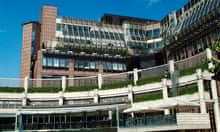Land Securities, one of Britain’s biggest property companies, has written down the value of its portfolio by almost £1bn but said interest in the London office market remained strong, with a growing focus on health and wellbeing.
The pandemic has led to a surge in the number of people working from home, but Mark Allan, the Landsec chief executive, was confident that demand for office space would hold up.
“The investment market for high-quality London office assets, such as those owned by Landsec, has remained robust throughout the pandemic and there is little sign of that interest waning,” he said.
The company, which owns the Trinity Leeds shopping centre and Bluewater in Kent, along with Deutsche Bank’s new London headquarters and an office complex near St Paul’s Cathedral, said the value of its office assets in London had declined by 1.9%, while other central London assets such as Piccadilly Lights, the huge LED advertising screen in Piccadilly Circus, and the property behind it, were unchanged in value. By contrast, its London shops had declined by 16.8% in value while regional shopping centres lost 20.4%.
Allan hailed Monday’s announcement from Pfizer and BioNTech that their coronavirus vaccine was 90% effective as a “significant positive for sentiment on all fronts” that would make it easier to bring people who were wary of crowded spaces because of coronavirus back into offices and shopping centres.
He said the company had been experimenting with new furniture, screens and floor layouts at its headquarters in Victoria, south-west London. Landsec wants to buy old offices and redevelop them, with a greater focus on outside space, ventilation and lighting.
Allan said the offices of the future would have more adaptable floor space “so it’s not just long banks of desks” and the trend of squeezing more people into office floors would reverse.
Landsec made a pre-tax loss of £835m in the six months to 30 September, up from last year’s loss of £147m, but will pay a dividend of 12p a share in January, down from 23.2p last year. It wrote down the value of its portfolio by £945m, or 7.7%, to £11.8bn.
The firm intends to sell £4bn of assets – a third of its portfolio – in the next four to five years, including its hotels, leisure properties and retail parks, which have been badly affected by the Covid-19 pandemic. They are valued at £1.4bn and make up 12% of its property portfolio. It will also sell some London offices when it can cash in on rising values.
The proceeds will be invested in what Landsec calls “urban opportunities” – typically mixed-use regeneration projects. For example, it wants to turn the 30-year-old shopping centre on Finchley Road in north London into 1,500 homes. It also plans to build suburban shopping centres.










